My Favorite Mistake: Learning Without Blame in Business and Leadership
My Favorite Mistake is a podcast about learning without blame in business and leadership.
Despite the name, it’s not just my favorite mistake—it’s yours, it’s ours, and it’s what we can all learn from when things don’t go as planned.
Hosted by author and consultant Mark Graban, each episode features honest conversations with leaders, executives, entrepreneurs, and changemakers about a meaningful mistake they made—and what they learned after things went wrong. How they responded. How they improved. How they grew as leaders.
This isn’t a show about failure theater, gotcha moments, or simplistic “lessons learned.” It’s about how real people reflect, improve, and lead better in complex organizations—without scapegoating, shame, or hindsight bias.
What You’ll Hear
• Leadership and management mistakes that reshaped careers, teams, and organizations
• How teams and leaders learn without blaming individuals
• Insights about culture, systems, decision-making, and psychological safety
• Practical lessons drawn from real experience, not abstract theory
Guests come from business, healthcare, technology, sports, entertainment, government, and academia, sharing stories that reveal how learning actually happens.
The Perspective
Mark brings a systems-thinking lens grounded in Lean management, continuous improvement, and psychological safety. The focus is less on who messed up and more on what the system taught us.
Who This Podcast Is For
• Leaders and managers who want to learn from mistakes without blame
• Executives working to build healthier, more resilient cultures
• Professionals who believe improvement starts with reflection, not punishment
My Favorite Mistake: Learning Without Blame in Business and Leadership
My Favorite Mistake is a podcast about learning without blame in business and leadership.
Despite the name, it’s not just my favorite mistake—it’s yours, it’s ours, and it’s what we can all learn from when things don’t go as planned.
Hosted by author and consultant Mark Graban, each episode features honest conversations with leaders, executives, entrepreneurs, and changemakers about a meaningful mistake they made—and what they learned after things went wrong. How they responded. How they improved. How they grew as leaders.
This isn’t a show about failure theater, gotcha moments, or simplistic “lessons learned.” It’s about how real people reflect, improve, and lead better in complex organizations—without scapegoating, shame, or hindsight bias.
What You’ll Hear
• Leadership and management mistakes that reshaped careers, teams, and organizations
• How teams and leaders learn without blaming individuals
• Insights about culture, systems, decision-making, and psychological safety
• Practical lessons drawn from real experience, not abstract theory
Guests come from business, healthcare, technology, sports, entertainment, government, and academia, sharing stories that reveal how learning actually happens.
The Perspective
Mark brings a systems-thinking lens grounded in Lean management, continuous improvement, and psychological safety. The focus is less on who messed up and more on what the system taught us.
Who This Podcast Is For
• Leaders and managers who want to learn from mistakes without blame
• Executives working to build healthier, more resilient cultures
• Professionals who believe improvement starts with reflection, not punishment
My Favorite Mistake: Learning Without Blame in Business and Leadership
Episodes
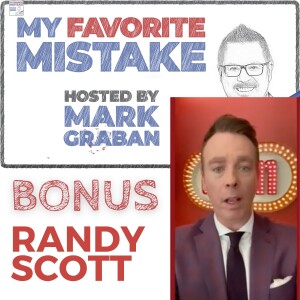
Thursday Dec 12, 2024
Randy Scott (ESPN) and the Live TV Mistake He Never Forgot
Thursday Dec 12, 2024
Thursday Dec 12, 2024
My guest for this bonus episode of the My Favorite Mistake podcast is ESPN anchor Randy Scott. He shares a hilarious yet humbling story from his early days on live television. Reflecting on an on-air blunder during Highlight Express, Randy reveals how the moment taught him resilience, the power of adaptability, and the importance of laughing at yourself.
Join us as Randy takes us behind the scenes at ESPN and shares valuable lessons learned from his favorite mistake!
See video, transcript, and more
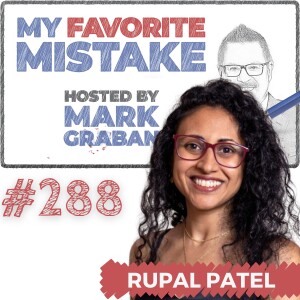
Monday Dec 09, 2024
Monday Dec 09, 2024
My guest for Episode #288 of the My Favorite Mistake podcast is Rupal Patel - she’s a former CIA analyst turned serial entrepreneur, who has embarked on an unconventional journey from military briefing rooms in jungles to corporate boardrooms and international stages.
Episode page with video, transcript, and more
Her newly released book, From CIA to CEO: Unconventional Life Lessons for Thinking Bigger, Leading Better, and Being Bolder, is not just a memoir but a comprehensive ops manual and tradecraft toolkit for leaders and entrepreneurs.
Serving primarily under President George W. Bush after 9/11, she became an intelligence expert on Afghanistan. She advised Four-Star Generals, earned War Zone Service Medals, and was recognized by the CIA Director for “superior support to the President of the United States.”
After leaving the CIA, she earned her MBA and started her first award-winning business over ten years ago. Rupal is a sought-after international speaker and corporate advisor who has spoken in front of thousands and delivered leadership and talent development programs for Fortune 500 companies around the globe and the White House.
In this episode, Rupal shares her journey from briefing four-star generals in war zones to advising Fortune 500 companies in boardrooms. She reflects on a defining moment at the CIA, where a false accusation taught her the importance of standing up for herself and overcoming self-blame. Rupal discusses lessons in leadership, the value of emotional intelligence, and the power of “tactical ignorance” in decision-making and problem-solving. She also explores how owning one’s uniqueness—what she calls “owning your weird”—can unlock potential and authenticity in leadership and life.
Questions and Topics:
What’s your favorite mistake, and what did you learn from it?
How did the accusation from your supervisor affect your working relationship?
Did that experience lead to your decision to leave the CIA?
What motivated you to join the CIA, and how did that opportunity come about?
How did your CIA experience shape your transition into business and leadership?
What CIA methods or mindsets do you think are most applicable to business strategy?
How do you balance strategic planning with the unpredictability of real-world situations?
Can you explain the concept of “tactical ignorance” and its role in decision-making?
What advice do you have for leaders or entrepreneurs facing setbacks or mistakes?
What inspired you to write From CIA to CEO, and what was the writing process like?
Did you need CIA approval to share details in your book?
What does “owning your weird” mean to you, and why is it important for leadership?
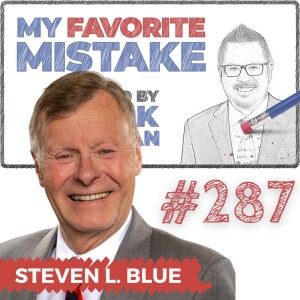
Monday Dec 02, 2024
Monday Dec 02, 2024
My guest for Episode #287 of the My Favorite Mistake podcast is Steven L. Blue, the CEO of Miller Ingenuity, a global manufacturer and supplier of railroad parts and high-technology rail safety systems and services.
Episode page with video, transcript, and more
He’s a recognized expert in business transformation. With 50 years of experience leading companies across diverse industries like manufacturing and publishing, Steve has a proven track record of turning businesses around and driving massive profit increases.
A best-selling author and regular media personality, Steve is also a sought-after keynote speaker who has spoken at prestigious venues like Harvard Business School, The United Nations, and Carnegie Hall. His leadership insights have been featured in major outlets like The Wall Street Journal, Fox Business, Forbes, and CNBC.
In this episode, we dive into the pivotal lessons learned from mistakes, exploring how past successes can plant the seeds for future missteps. Steve shares his story of a bold but ultimately flawed business venture in Cuba, unpacking how ego and faulty assumptions led to failure—and valuable insights.
We discuss the importance of testing assumptions, inviting challenges from peers and boards, and fostering a culture that learns from, rather than fears, mistakes. Steve also highlights the transformation of Miller Ingenuity, offering wisdom on leadership, rebranding, and building a culture of continuous improvement that empowers employees to innovate and adapt.
This conversation is rich with reflections on the intersection of humility, risk-taking, and the resilience required to navigate today’s business landscape.
Questions and Topics:
What is your favorite mistake, and what did you learn from it?
What was the event at Carnegie Hall where you spoke?
How did you approach navigating the challenges of broadcasting from Cuba?
Why do you think there was low interest in the U.S. for the Cuba broadcast?
What lessons did you take away about making assumptions in business?
How do you accurately forecast interest in new ventures?
What role does ego play in decision-making, and how can it lead to mistakes?
Why is failure an important part of learning and eventual success?
How do you test assumptions before making significant investments?
What’s the role of a board of directors in challenging and validating assumptions?
How do you navigate resistance to new ideas within your team or board?
What was the process behind rebranding Miller Ingenuity?
How did you ensure the rebrand was successful and aligned with your business goals?
What role does culture play in Lean manufacturing at Miller Ingenuity?
How do you foster an environment where employees feel safe admitting mistakes?
What’s your approach to hiring and ensuring cultural fit within your teams?
How do you balance empowering teams with stepping in during a crisis?
What leadership attitudes are most likely to lead to business disasters?
What steps do you take to prevent and respond to unforeseen disasters?
What advice would you give to other leaders about sustaining a culture of continuous improvement?
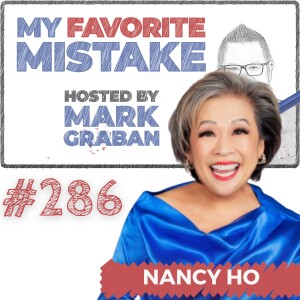
Monday Nov 25, 2024
Nancy Ho on Losing $300,000 and Redefining Success After Failure
Monday Nov 25, 2024
Monday Nov 25, 2024
My guest for Episode #286 of the My Favorite Mistake podcast is Nancy Ho, a distinguished Life Strategist, Clarity Messenger, and State of Mind Specialist with over 26 years of experience guiding individuals toward holistic success.
Episode page with video, transcript, and more
Throughout her illustrious career, Nancy has empowered over 10,000 clients, including C-Suite executives, mid-level managers, and business owners, to navigate the intricate balance between professional achievement and personal fulfillment.
She’s co-author of the book Success Redefined with Jack Canfield.
In today's episode, Nancy shares the story of her favorite mistake—losing $300,000 in just five months pursuing a lifelong dream of opening a wine bar. She reflects on the critical lessons she learned about the importance of due diligence, trusting gut instincts, and recognizing misaligned partnerships. Nancy discusses how this experience shaped her approach to coaching, helping clients uncover their life purpose, navigate the paradox of professional success, and integrate work and personal fulfillment. She offers practical strategies for managing stress, addressing incomplete tasks, and shifting from fear-based thinking to resilience and clarity. Nancy’s insights provide inspiration and actionable advice for anyone striving to align their career, values, and sense of purpose.
Questions and Topics:
What is your favorite mistake?
What were some of the biggest challenges you faced during this venture, and how did you handle them?
What lessons did you learn from this experience, and how do you apply them in your work today?
Do you have any regrets about walking away from the business?
What is your life purpose, and how do you help others articulate theirs?
What do you mean by the “professional paradox,” and how do you help clients facing career and life challenges?
How do you approach unraveling the root causes of professional struggles for your clients?
What strategies do you recommend for managing stress caused by incomplete tasks?
How do you help clients shift from fear of failure to a mindset of resilience and growth?
How has this mistake influenced your approach to life and business coaching?
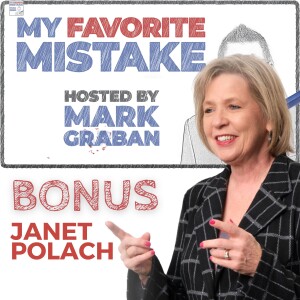
Thursday Nov 21, 2024
Bonus: Janet Polach, Ph.D. on The Strategic Leader’s Mindset, Her New Book
Thursday Nov 21, 2024
Thursday Nov 21, 2024
Welcome back to My Favorite Mistake! In this bonus episode, host Mark Graban reconnects with returning guest Dr. Janet Polach, a retired U.S. Marine Corps lieutenant colonel and PhD in organizational development.
Janet, who previously appeared on Episode 175, shares insights from her new book, "The Strategic Leader's Mindset: Unlocking the Keys to Success." This book offers actionable strategies for executives making the challenging shift to strategic leadership roles. Janet's website: https://janetpolach.com/
In this conversation, Janet explores key concepts such as embracing ambiguity, strengthening internal and external relationships, and the importance of setting aside dedicated time to develop strategic thinking. She dives into the practical tools and exercises included in each chapter to help leaders take action on what they learn.
Tune in to hear how Janet's approach to writing has evolved, her lessons on strategic leadership, and why it’s essential to engage with peers across industries to drive innovation and insight.
Plus, get a glimpse into Janet’s favorite leadership lessons, from “leaning into ambiguity” to harnessing outside perspectives for organizational success. If you’re an aspiring or seasoned leader, this episode is packed with valuable advice.
And if you missed her original episode, catch Janet's "favorite mistake" story in Episode 175 at https://www.markgraban.com/mistake175
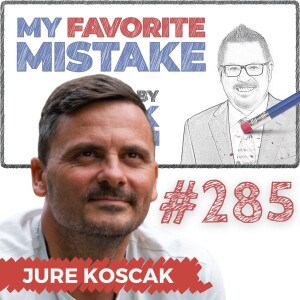
Monday Nov 18, 2024
Jure Koscak on Overtraining, Injury, and Learning to Listen to His Body
Monday Nov 18, 2024
Monday Nov 18, 2024
My guest for Episode #285 of the My Favorite Mistake podcast is Jure Koscak, a former professional table tennis player who competed for 15 years at the highest levels.
EPISODE PAGE WITH VIDEO, TRANSCRIPT, AND MORE
Alongside his athletic career, Jure pursued a deep interest in sports psychology, which eventually led him to earn a Ph.D. in physical education. For the past 15 years, he has specialized as a high-performance mental coach, working with over 50 professional athletes across various sports, as well as more than 1,000 private clients.
Jure is a polyglot, fluent in six languages, including Slovenian, English, Spanish, German, Serbo-Croatian, and French. His diverse background and experience allow him to connect with a wide range of clients, helping them not just to survive but to thrive in both their sports careers and personal lives.
In this insightful conversation, Jure shares his favorite mistake—his hip injury, which he attributes to a combination of arrogance and overtraining. Despite his professional success, Jure reflects on how he neglected the early warning signs from his body, overworked himself, and disregarded the balance necessary to sustain long-term performance. This mistake, which eventually led to a debilitating hip injury, forced him to confront the importance of listening to his body and respecting its limits.
Jure also discusses his transformation from athlete to coach, explaining how he now uses his experiences to help others avoid the same pitfalls. The episode explores the mind-body connection, overtraining, chronic pain, and how unresolved emotional issues can manifest physically. Jure introduces the AEQ Method, a somatic approach that helps individuals reconnect with their bodies, reduce chronic pain, and elevate emotional maturity. His goal is to empower athletes and individuals to become more self-aware, both mentally and physically, so they can perform at their best without sacrificing long-term health.
Questions and Topics:
What would you say is your favorite mistake?
How would you say injuring your hip was a mistake?
Did your hip injury occur during your peak in table tennis?
Did that injury end your career?
Was there a moment when you realized you weren’t listening to your body, or had you been aware of the mistake earlier?
Can you explain the AEQ Method and how it helps people?
How did you transition into coaching non-athletes?
How do people find you—are they seeking balance, dealing with pain, or something else?
Why do people self-sabotage, and is it tied to trauma or fear?
Why do people continue with behaviors they know are harmful?
How did helping 1 million people with chronic pain become your mission?
How much of positivity is personality versus something we can develop and learn?
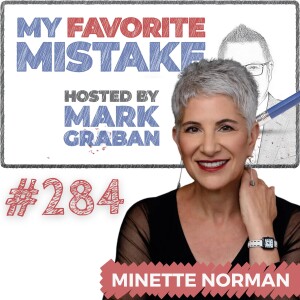
Monday Nov 11, 2024
Minette Norman on Psychological Safety, Privilege, and Inclusive Leadership
Monday Nov 11, 2024
Monday Nov 11, 2024
My guest for Episode #284 of the My Favorite Mistake podcast is Minette Norman, an author, speaker, and leadership consultant who previously spent decades leading global technical teams in the software industry.
EPISODE PAGE WITH VIDEO, TRANSCRIPT, AND MORE
Minette has extensive experience leading internationally distributed teams and believes that when groups embrace diversity in all its forms, breakthroughs emerge, and innovation accelerates.
Her most recent position before starting her consultancy was as Vice President of Engineering Practice at Autodesk.
Minette is a keynote speaker on inclusive leadership, psychological safety, collaborative teams, and empathy. She was named in 2017 as one of the “Most Influential Women in Bay Area Business” by the?San Francisco Business Times and as “Business Role Model of the Year” in the 2018 Women in IT/Silicon Valley Awards.
In this episode, the conversation covers the critical importance of psychological safety and inclusive leadership in the workplace. Minette shares stories from her tech career, highlighting the challenges of navigating power dynamics, cultural differences, and the role of empathy in leadership. She emphasizes the need for leaders to create environments where individuals feel safe to speak up, make mistakes, and share diverse perspectives without fear of retribution.
Minette is the author of The Boldly Inclusive Leader and co-author of The Psychological Safety Playbook.
The discussion also touches on the common misunderstandings about psychological safety, such as confusing it with comfort, and explores practical ways leaders can foster a culture of openness and accountability while maintaining high performance and innovation.
Questions and Topics:
What is your favorite mistake, and what did you learn from it?
How did your mentee’s situation change your perspective on leadership?
Did you consider legal action when you faced bullying and had to leave tech?
How do you define psychological safety, and why is it so important?
Can you have too much psychological safety?
How can leaders assess and improve psychological safety within their teams?
What role do leaders play in fostering a culture where it’s safe to admit mistakes?
How do demographic differences impact experiences of psychological safety?
How universal are the concepts of psychological safety and inclusion across cultures?
What advice do you have for leaders hesitant to admit their own mistakes?
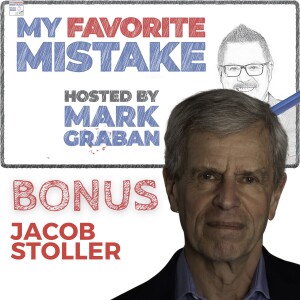
Thursday Nov 07, 2024
Jacob Stoller on Mistakes in Music: A Concert Train Wreck and Lessons Learned
Thursday Nov 07, 2024
Thursday Nov 07, 2024
In this bonus episode, Mark Graban sits down with author and speaker Jacob Stoller to discuss one of Jacob’s most memorable mistakes—a live performance mishap involving a botched page turn during a classical music concert.
As Jacob recounts, his decision to skip having a page-turner led to a "train wreck" moment in front of an audience, forcing the musicians to restart the piece. But this unexpected blunder turned out to be a surprising gift, making the experience more relatable and memorable for the audience.
Listen as Jacob reflects on how this mistake shifted his view on performance and connected him with listeners in a new way. Mark also shares his own story of a music slip-up, proving that even the most prepared musicians and performers can find themselves at a loss. This episode is a perfect blend of music, humility, and the valuable lessons we take from our mistakes.
🔗 Want to learn more about Jacob’s insights into performance and productivity? Check out his latest book, Productivity Reimagined: Shattering Performance Myths to Achieve Sustainable Growth, and listen to his full episode on the Lean Blog Interviews podcast.
⏩ Topics Covered:
The importance of learning from mistakes in any field
How to handle slip-ups and turn them into positive moments
Classical music, page-turning mishaps, and human connection through errors
Mark and Jacob's personal stories of musical mistakes and the lessons learned
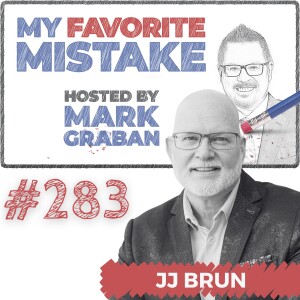
Monday Nov 04, 2024
JJ Brun on Trust, Mistakes, and Intelligence Work
Monday Nov 04, 2024
Monday Nov 04, 2024
My guest for Episode #283 of the My Favorite Mistake podcast is Jean Jacques “JJ” Brun… also known as Operative 431.
Episode page with video, transcript, and more
As a seasoned veteran of the Intelligence Branch of the Canadian Armed Forces, he served with distinction as a contact handler on the ground in Bosnia and Herzegovina.
Years in the discrete world of human intelligence and counter human intelligence have driven my desire to understand human behavior’s intricacies and pass on the complex notion of interpersonal communication.
Although retired from active duty, JJ realized much of what he learned could be utilized in the civilian world. Based on the Four Temperament (DISC) Model of Human Behaviour to better understand and maximize human dynamics, his exclusive training programs provide a comprehensive analysis of communication techniques, empowering individuals to enhance authentic relationships that promote trust, innovation, and productivity.
In this episode, the conversation explores JJ Brun's transition from his role as an intelligence operative in the Canadian Armed Forces to applying his expertise in the civilian world. JJ shares stories from his time in Bosnia and the challenges of adapting to intelligence work without formal military training. He discusses key lessons learned, including the importance of self-awareness, situational awareness, and using behavioral models like DISC to understand and build relationships. The episode highlights how these skills, initially developed for high-stakes intelligence work, have proven valuable in helping leaders and organizations understand human dynamics more effectively.
Questions and Topics:
What does it mean to be a contact handler in intelligence?
What would you say is your favorite mistake?
Did anyone know you didn’t finish the last mile of the marchathon?
Was the training in the UK meant to prepare you for being on the other side of an interrogation?
How did you handle the potential for mistakes being deadly in intelligence work?
What was the Oka crisis?
What is involved in being a contact handler?
Was the debrief after your training focused on learning from mistakes, or did you get reprimanded?
How did you adapt to working in a war zone like Bosnia?
What’s the value of using the DISC model in your work today?
Can people learn more about your work and the DISC model through your website?
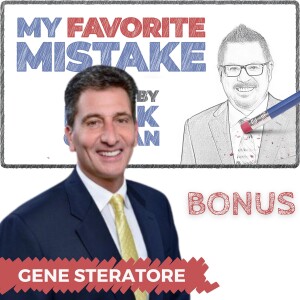
Thursday Oct 31, 2024
Gene Steratore on Learning From Mistakes
Thursday Oct 31, 2024
Thursday Oct 31, 2024
In this special bonus episode of My Favorite Mistake, our guest (via Cameo) is Gene Steratore, a former NFL and NCAA basketball official known for his calm demeanor, fairness, and expertise on the field and court.
Episode page with video and transcript.
With over 15 years as an NFL referee and a longstanding career in NCAA basketball officiating, Steratore became a trusted figure in sports, celebrated for managing high-stakes games, including playoff and Super Bowl matchups. After retiring from officiating, he transitioned to broadcasting as a rules analyst for CBS Sports, where he brings insights on officiating decisions and the human element in sports.
Gene graciously shares his perspective on the importance of learning from mistakes both on and off the field. Gene reflects on the challenges of officiating, where striving for perfection meets the reality of human fallibility. He discusses the humility required to accept imperfection in the moment and the invaluable lessons mistakes provide for honing one's craft.
Beyond sports, Gene explores how these lessons translate to everyday life, emphasizing the importance of self-reflection, resilience, and growth. This episode is a must-listen for anyone looking to embrace the learning journey that comes with making – and learning from – mistakes.
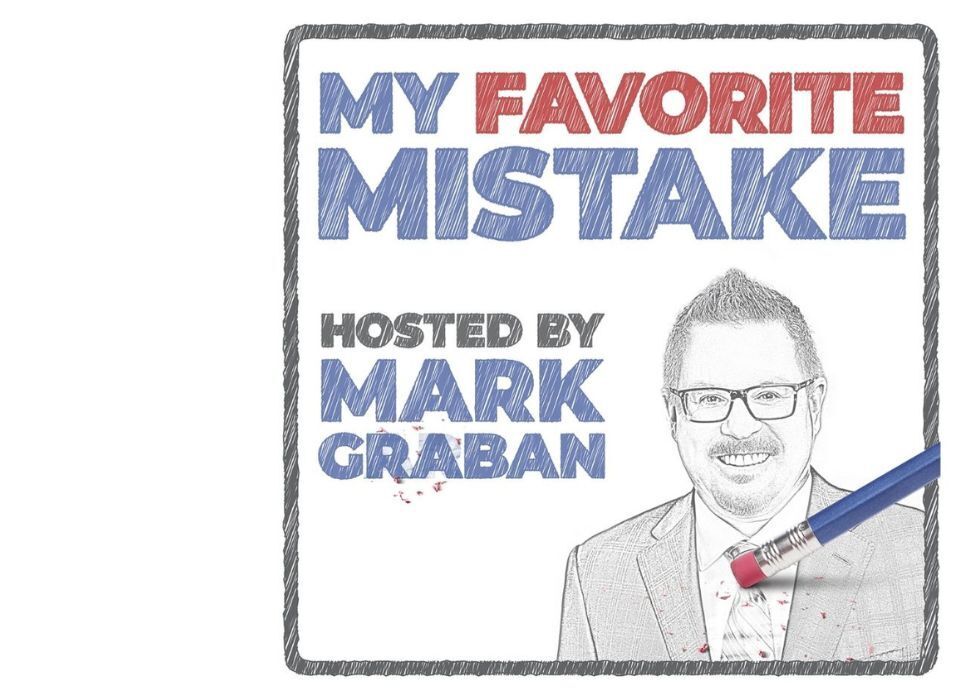
About Mark Graban
Mark Graban is an author, speaker, and consultant, whose latest book, The Mistakes That Make Us: Cultivating a Culture of Learning and Innovation, is available now.
He is also the author of the award-winning book Lean Hospitals: Improving Quality, Patient Safety, and Employee Engagement and others, including Measures of Success: React Less, Lead Better, Improve More.
He serves as a consultant through his company, Constancy, Inc, and is also a Senior Advisor for the technology company KaiNexus.
Mark hosts podcasts, including “Lean Blog Interviews” and “My Favorite Mistake.”
Education: B.S. in Industrial Engineering from Northwestern University; M.S. in Mechanical Engineering, and M.B.A. from the Massachusetts Institute of Technology’s Leaders for Global Operations Program.









